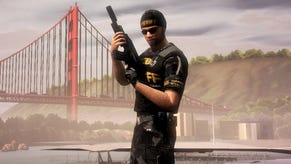The Fall of Realtime Worlds
An insider speaks out.
"Like I said, because there was such a sense of friends and family within Realtime Worlds, there were a few people that you knew should stay on because they were excellent at their job. When their name was read out they got claps and whoops, people were congratulating them, there were cheers.
"There were moments of silence, of course, where everybody was just looking at the floor. It wasn't all nice obviously. But yeah, that sense of family survived."
It wasn't nice at all. The layoffs ripped a hole in both the town of Dundee and the lives of those affected. Over 60 per cent of RTW staff had relocated to Scotland. Suddenly cut adrift, families and individuals were left without work and had little hope of receiving either wages or redundancy pay. For them, it was catastrophic.
For Bateman and his friends the only answer was to drink. A lot. So that's exactly what they did, drowning their sorrows until the early hours. "It's what we all needed to do, to consolidate, recover. We got absolutely twatted."
The next week, as many of Bateman's friends and colleagues signed on or tried to find their way back home, the reality of life under the administrators revealed itself. According to the terms of the deal, RTW had just six weeks to find a buyer for APB. Failure to do so would spell the definitive end of both the studio and the game.
In the meantime, all the company's assets were to be painstakingly raked through in order to calculate their material worth. As Bateman and the rest of the 50 survivors ploughed on, the administrators counted fire extinguishers.
The next six weeks slipped by as a procession of publishers, businessmen and potential buyers padded through the RTW offices. Rumours circulated in the press. Epic Games was linked with a buyout, among others. But no buyer came forward. The six week stay of execution was up.
Dave Jones, the man that had created the studio in 2002, made his way around the building to deliver the bad news. Bateman recalls, "Dave came around and apologised to everybody individually, informing us that APB didn't have a buyer. He laid down the simple facts that he could, saying, 'At some point today, the servers will be shut down.' He was so emotionally invested, you could see that it hurt to say it. He was gutted.
"So I went and made a cup of tea and thought, 'F*** me, this is a bad day.'"
Some reacted badly, pointing the finger at Jones as the culprit. Emotions ran high as people looked for someone to blame. But it was wasted energy. Bateman drafted one final post for the website: "APB is coming to a close." It was over.
After receiving the news, most of the former employees left for the pub straight away. But a core of the now jobless staff remained at the studio well into the night. Though the studio was finished and APB was effectively dead they didn't want to say goodbye, to each other or the game.
"We stayed on, even though we knew we were fired," say Bateman. "We were running the servers, trying to get contingency plans in place, so we could try to do stuff from home. It was like the Titanic was sinking but people were trying to patch it up just in case.
"Let's say if the login server went down, nobody would be able to login. So if we could secure and support just one login server, then as long as the districts were on another server then everything would be fine. We were trying to support the service, but no-one really had the resources."
In the space of 86 days APB had launched, almost immediately gone onto life support, then passed away quietly - taking an award-studded, multi-million dollar studio and hundreds of jobs with it. The scale and speed of the APB's failure is unparalleled in the history of the industry.
"I was a youngster at the company," says Bateman. "I was only there for 12 months, some people were there for five, six years. It was our heart and soul. In the year I was there I ran a closed beta, an open beta, launched an MMO and closed it. I experienced everything there was to experience, good and bad."
Rather than any resentment or anger towards the fate of the game and his employers, Bateman is filled only with regret. "There's no need for finger-pointing," he says. "It was a multitude of things that contributed to Realtime Worlds failing and APB failing.
"But we made such massive progress in that last year. If we had that kind of drive for maybe two years, then we would have had the most phenomenal game. We could of made the game that everybody wanted.
"Regardless of everything that happened, I still maintain that I had the best job in the world. I loved APB. Still do. I just wish that it could have gone on a little longer."






























